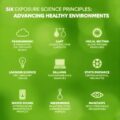LA JOLLA (June 18, 2024)—Salk Institute Assistant Professor Jesse Dixon has been named a 2024 Pew Biomedical Scholar by The Pew Charitable Trusts. This honor provides funding to early-career investigators who demonstrate outstanding promise in science toward advancing human health. Dixon and the other 21 awardees will each receive $300,000 over four years to support their research.
LA JOLLA (June 18, 2024)—Salk Institute Assistant Professor Jesse Dixon has been named a 2024 Pew Biomedical Scholar by The Pew Charitable Trusts. This honor provides funding to early-career investigators who demonstrate outstanding promise in science toward advancing human health. Dixon and the other 21 awardees will each receive $300,000 over four years to support their research.
“Through his development and use of leading-edge genetic tools, Jesse has already made a major impact on how we study diseases such as cancer,” says Salk President Gerald Joyce. “His work has the potential to transform diagnostic tools and therapies for many human diseases, and we are glad to see him recognized by The Pew Charitable Trusts for these ongoing contributions.”
Dixon, a physician-scientist, is a member of both the Gene Expression Laboratory and the Salk Cancer Center faculty. His research uses molecular and computational approaches to explore how our genomes—the totality of genetic information in each of our cells—are organized, and how abnormal genome folding leads to disease.
Dixon’s recent work has helped define the relationship between our genomes and cancer. In 2022, he pinpointed certain genetic mutations that turn cancer genes “on,” helping scientists better understand where cancer originates and how best to treat it. In 2023, he discovered that the protein Foxp3 determines the genome structure and activity of T cells—important cancer-fighting immune cells. Scientists can now work to target Foxp3 to create T cells that more effectively contribute to the fight against cancer.
Dixon also invents tools to advance and expedite genetics research. His lab recently developed a technique for studying two levels of gene regulation at once, which can be used to clarify how genetic variations contribute to human disease. Currently, his team is developing new methods to study gene organization and gene function in single cells.
“I’m very grateful to have support from The Pew Charitable Trusts and to be named a Pew Biomedical Scholar,” says Dixon. “This funding will help my lab continue studying how structural alterations to chromosomes rewire the genome and how this contributes to various human diseases.”
Dixon received a National Institutes of Health (NIH) Early Independence Award in 2016, was selected as a Rita Allen Foundation Award Scholar in 2023, and was named one of the most highly cited researchers in the world in 2022 and 2023 by Clarivate. The honor of being named a Pew Biomedical Scholar is another validation of his work’s positive impact on science and human health, and the enormous potential of his research career.
About the Salk Institute for Biological Studies:
Unlocking the secrets of life itself is the driving force behind the Salk Institute. Our team of world-class, award-winning scientists pushes the boundaries of knowledge in areas such as neuroscience, cancer research, aging, immunobiology, plant biology, computational biology, and more. Founded by Jonas Salk, developer of the first safe and effective polio vaccine, the Institute is an independent, nonprofit research organization and architectural landmark: small by choice, intimate by nature, and fearless in the face of any challenge. Learn more at www.salk.edu.
About The Pew Charitable Trusts:
Founded in 1948, The Pew Charitable Trusts uses data to make a difference. Pew addresses the challenges of a changing world by illuminating issues, creating common ground, and advancing ambitious projects that lead to tangible progress.









No Comments
Leave a comment Cancel